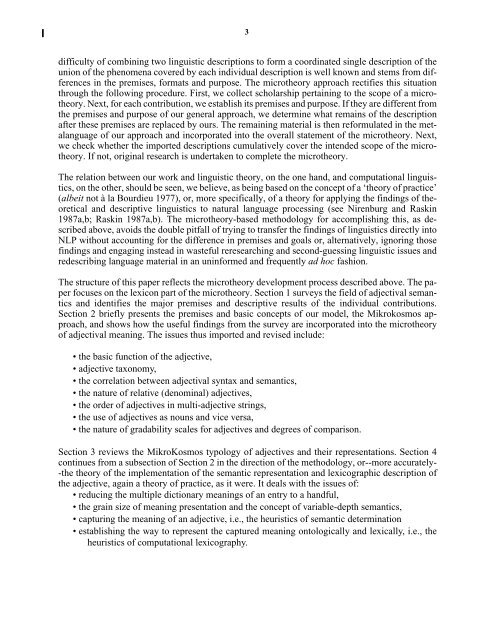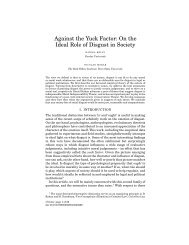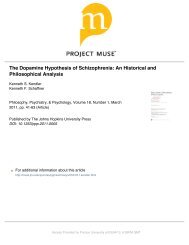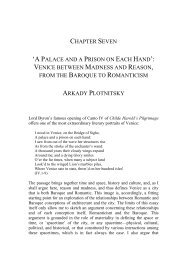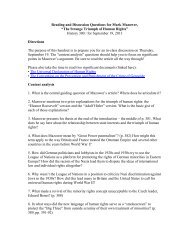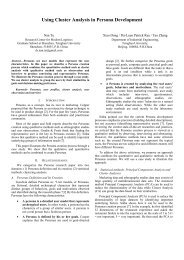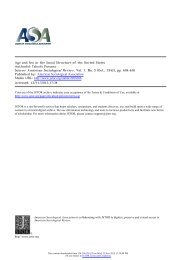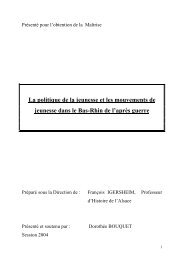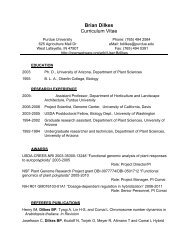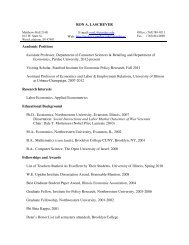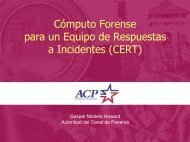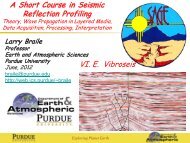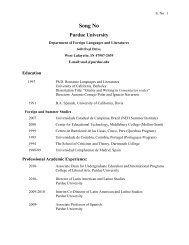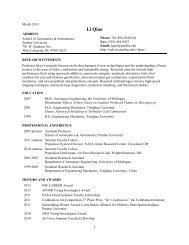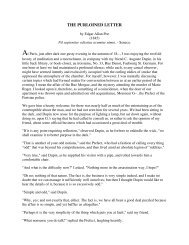Lexical Semantics of Adjectives - CiteSeerX
Lexical Semantics of Adjectives - CiteSeerX
Lexical Semantics of Adjectives - CiteSeerX
You also want an ePaper? Increase the reach of your titles
YUMPU automatically turns print PDFs into web optimized ePapers that Google loves.
3<br />
difficulty <strong>of</strong> combining two linguistic descriptions to form a coordinated single description <strong>of</strong> the<br />
union <strong>of</strong> the phenomena covered by each individual description is well known and stems from differences<br />
in the premises, formats and purpose. The microtheory approach rectifies this situation<br />
through the following procedure. First, we collect scholarship pertaining to the scope <strong>of</strong> a microtheory.<br />
Next, for each contribution, we establish its premises and purpose. If they are different from<br />
the premises and purpose <strong>of</strong> our general approach, we determine what remains <strong>of</strong> the description<br />
after these premises are replaced by ours. The remaining material is then reformulated in the metalanguage<br />
<strong>of</strong> our approach and incorporated into the overall statement <strong>of</strong> the microtheory. Next,<br />
we check whether the imported descriptions cumulatively cover the intended scope <strong>of</strong> the microtheory.<br />
If not, original research is undertaken to complete the microtheory.<br />
The relation between our work and linguistic theory, on the one hand, and computational linguistics,<br />
on the other, should be seen, we believe, as being based on the concept <strong>of</strong> a ‘theory <strong>of</strong> practice’<br />
(albeit not à la Bourdieu 1977), or, more specifically, <strong>of</strong> a theory for applying the findings <strong>of</strong> theoretical<br />
and descriptive linguistics to natural language processing (see Nirenburg and Raskin<br />
1987a,b; Raskin 1987a,b). The microtheory-based methodology for accomplishing this, as described<br />
above, avoids the double pitfall <strong>of</strong> trying to transfer the findings <strong>of</strong> linguistics directly into<br />
NLP without accounting for the difference in premises and goals or, alternatively, ignoring those<br />
findings and engaging instead in wasteful reresearching and second-guessing linguistic issues and<br />
redescribing language material in an uninformed and frequently ad hoc fashion.<br />
The structure <strong>of</strong> this paper reflects the microtheory development process described above. The paper<br />
focuses on the lexicon part <strong>of</strong> the microtheory. Section 1 surveys the field <strong>of</strong> adjectival semantics<br />
and identifies the major premises and descriptive results <strong>of</strong> the individual contributions.<br />
Section 2 briefly presents the premises and basic concepts <strong>of</strong> our model, the Mikrokosmos approach,<br />
and shows how the useful findings from the survey are incorporated into the microtheory<br />
<strong>of</strong> adjectival meaning. The issues thus imported and revised include:<br />
• the basic function <strong>of</strong> the adjective,<br />
• adjective taxonomy,<br />
• the correlation between adjectival syntax and semantics,<br />
• the nature <strong>of</strong> relative (denominal) adjectives,<br />
• the order <strong>of</strong> adjectives in multi-adjective strings,<br />
• the use <strong>of</strong> adjectives as nouns and vice versa,<br />
• the nature <strong>of</strong> gradability scales for adjectives and degrees <strong>of</strong> comparison.<br />
Section 3 reviews the MikroKosmos typology <strong>of</strong> adjectives and their representations. Section 4<br />
continues from a subsection <strong>of</strong> Section 2 in the direction <strong>of</strong> the methodology, or--more accurately-<br />
-the theory <strong>of</strong> the implementation <strong>of</strong> the semantic representation and lexicographic description <strong>of</strong><br />
the adjective, again a theory <strong>of</strong> practice, as it were. It deals with the issues <strong>of</strong>:<br />
• reducing the multiple dictionary meanings <strong>of</strong> an entry to a handful,<br />
• the grain size <strong>of</strong> meaning presentation and the concept <strong>of</strong> variable-depth semantics,<br />
• capturing the meaning <strong>of</strong> an adjective, i.e., the heuristics <strong>of</strong> semantic determination<br />
• establishing the way to represent the captured meaning ontologically and lexically, i.e., the<br />
heuristics <strong>of</strong> computational lexicography.


